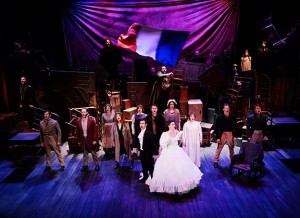No Words to Describe Lamb’s’ Stupendous ‘Les Miz’
Robert Smyth, Lamb’s Players Theatre producing artistic chief and director of the group’s current Les Misérables, took it on himself to address a key issue with the show on the day I saw it. Lamb’s’ floor-level stage surface is rather modest as playing areas go, and the venue’s 348-seat gallery doesn’t exactly scream blockbuster (Les Miz, an epic drama based on the legacy of the French Revolution, can accommodate a cast of as many as 70 and a 32-member symphony orchestra at its peak).
Even so, in a pre-show speech, Smyth used the word “intimate” to describe his piece. The scope of history, he seemed to suggest, doesn’t necessarily presume wholesale blood ‘n’ guts (the actual tale involves the June Rebellion, a relatively small Parisian insurrection over three days in the summer of 1832, some 43 years after the flap that cost Marie Antoinette her bouffant) – from there, a colossal suspension of disbelief takes hold as Smyth’s troupe flawlessly fuels the tiny caper that speaks to all human despair and hope.

Cosette (Charlene Koepf) and Marius (Jesse Abeel) swear their allegiance in voice in Lamb’s Players’ ‘Les Miserables.’ Photos by Ken Jacques.
This absolutely stupendous entry isn’t theater so much as theater history, constrained not by somebody’s idea of a seating plan or set design but only amid the tumultuous beat of its central character’s boundless heart.
You marginally know him from the immense Victor Hugo novel as prisoner 24601. You personally know him as Jean Valjean, for whom no good deed goes unpunished. The short story is that he’s on parole in the Toulon of 1815 for stealing a loaf of bread – but don’t forget that this is a sketchy time in France, and the scheming Inspector Javert has Valjean in his sights. Valjean, of course, takes the high road – now a respected citizen, he agrees to care for Cosette, whose mom Fantine once resorted to prostitution to pay for her daughter’s care at the hands of two evil innkeepers.
A love triangle between street-girl Eponine, insurgent Marius and Cosette will develop, with the angry rebels singing of their hopes for France’s emergence as a democratic republic, fighting to the last in the Paris of 1832. The 17 years in between have altered Valjean’s and Cosette’s lives beyond recognition.
The French Republic was the center of the universe when Hugo set his book (for me, it still is, but that’s another story) – at show’s end, the unfurled tricolor flag lives and breathes as much as Smyth and music director G. Scott Lacy apply every readable nuance in taking the cast to that point. The slurred speech and flouncy repartee in the jaunty “Master of the House,” featuring Deborah Gilmour Smyth as the chalky Madame Thénardier; the gallows humor in Javert’s rocky bass as Randall Dodge sings “The Runaway Cart”; the full-throated respite in “A Heart Full of Love,” with Cosette, Marius and Eponine (Charlene Koepf, Jesse Abeel and Allie Trimm); the mellifluous falsetto in Valjean’s “Bring Him Home,” rendered by a superb Brandon Joel Maier: Every single phrase is across the street from every other single phrase as this group revels in its exhaustive culture of ensemble.

Madame Thenardier (Deborah Gilmour Smyth) engages in her regular pastime.
When you’re not swept up in the incomparable production values, you’re wondering how Smyth crafted the logistics that take this play so desperately far beyond the space limitation (compounded by Mike Buckley’s sixes-and-sevens scene design, which further encumbers the stage despite its cleverness). But Smyth is an exceptionally conceptual thinker – he transcends the space dilemma by conceiving the images that eclipse it, and in the 10 years I’ve been reviewing Lamb’s, he’s done this time and again. Guy could direct the Holocaust on a postage stamp.
Claude-Michel Schönberg’s music and Alain Boublil’s book and lyrics fit Carlos Mendoza’s and Jordan Miller’s choreographies like they were made for them. Jeanne Barnes Reith’s superb costumes speak to the rest of the sublime tech effort as the wonderfully interpretive nine-piece orchestra, led by Chuck and Nicki Elledge, peeks out from the junk. On and on and on the superlatives go, recycled only because there aren’t enough of them (and even if there were, there are only 24 hours in a day).

The French Republic’s staple symbol unfurls over the cast of ‘Les Miserables.’
I always like to postulate that France and the United States enjoy life in a parallel universe. Each country knows exactly what it wants to be (one like the other), and each country trips monstrously over itself in trying to get there. That’s why Les Misérables, which won nine Tonys in 1987 and was nominated for three of them in the 2013 revival, speaks to us so plaintively. Without excuses, we are Valjean and Javert and everybody in between. If Lamb’s’ positively transcendent production isn’t proof enough, then no such proof exists.
Oh. My. God.
This review is based on the matinée performance of July 27. The magnificent Les Misérables runs through Sept. 28 at Lamb’s Players Theatre, 1142 Orange Ave. in Coronado. $32-$82. 619-437-6000, lambsplayers.org.

Martin Jones Westlin, principal at editorial consultancy Words Are Not Enough and La Jolla Village News editor emeritus, has been a theater critic and editor/writer for 25 of his 47 years…
More…



You should see CCT’s Les Mis atop Mt. Helix. Unbelievably Fantastic as well!